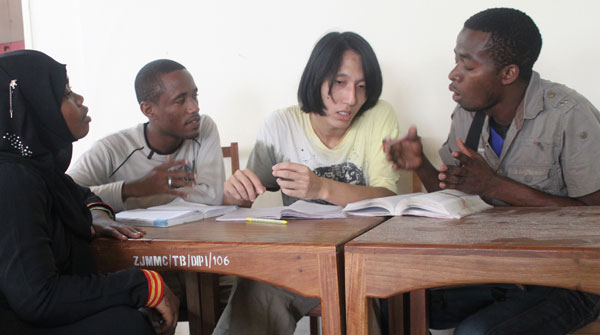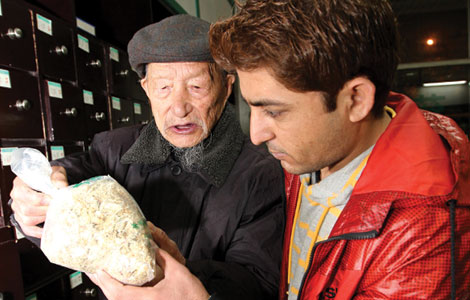 |
|
|
|
|||||||||||
When Shen Yuning announced he was planning to compile a Swahili-Chinese dictionary, most of his friends thought he was joking.
Since that online post in December, Shen has compiled nearly 5,000 words, working at least 15 hours a day in Kenya and Tanzania with help from some Africans.
 |
|
Shen Yuning (second from right) works with students from the Zanzibar Journalism and Mass Media College on Wednesday. Provided to China Daily |
The 26-year-old plans to include 25,000 words in the dictionary by August before he heads back to university in Germany, where he studies African languages.
"There is an increasing exchange of labor between Africa and China, but many Chinese workers here can speak only Chinese, while locals only speak Swahili and poor English," said Shen, an exchange student at Kenya's Kenyatta University.
"Of the several African languages I've learned, Swahili is my best," Shen said, adding that Swahili is also the most important language in East African countries including Tanzania, Kenya and Uganda, with more than 80 million speakers.
He hopes the dictionary will be helpful for Chinese workers in East Africa.
"There are free online translation tools, but they are rubbish when it comes to the translation of African language," Shen said.
"Moreover, most Chinese workers in Africa don't have easy access to the Internet, while a dictionary is portable and much more convenient to use."
There was one Swahili-Chinese dictionary compiled in the 1970s, but this hasn't dissuaded Shen from continuing.
"Vocabulary changes over time. Many words and meanings have gone through immense changes over the past decades considering China's tremendous changes during the same period," Shen said.
Ao Manyun, who teaches Swahili at the Communication University of China,met Shen in Tanzania in February after hearing he was compiling the dictionary.
"I think what he is doing now is very good. He is so young and has such high passion for Africa. He lives a very simple life there, and except for basics like eating and sleeping, he spends all his time working on the dictionary. It's really not easy," she said.
According to Ao, four universities on the mainland offer Swahili as a major, each enrolling around 10 to 20 students every two to six years.
"I think Shen's dictionary will have its own advantage for its rich, live and fresh vocabulary since he lives with the locals," she said.
He collects daily-use vocabulary first from communication with local classmates and friends, and follows literature, technology and TV and radio for media words.
Shen also gets words from new, popular storybooks.
Hassan Ali Mohammed, a 23-year-old tour guide in Zanzibar, Tanzania, has worked for Shen for two months. His main job is to collect words from books, discuss them with Shen and analyze their different meanings.
"He speaks very good Swahili," Mohammed said. "It's very interesting to work with him and to share ideas with him."
Benedict Daniel Nassary, a 28-year-old shopkeeper in Zanzibar, discovered working for Shen is sometimes quite difficult because "it uses a lot of brain."
"There are many words, they have more than one meaning, sometimes you have to think too much," he said.
Despite the heavy workload, Shen feels happy whenever he thinks of how the dictionary might enable more Chinese to communicate with local Africans.
"For me, nothing is more wonderful than to communicate with people from very different cultural backgrounds, which I believe many would agree with," Shen said.
Yu Kai, a high school classmate of Shen's at Nanjing Foreign Language School, said Shen has a keen interest in linguistics.
"He can speak about a word's multiple meanings and use for hours, even during our daily conversations."
However, Shen hasn't found any authority willing to examine his dictionary or any publisher willing to publish it.
And he is running out of money to live on.
Many of Shen's former schoolmates, including Yu, have offered helping hands.
"I hope on the day it gets published, whoever reads the preface will think: it's a miracle," Shen said.

|

|

|

|

|

|